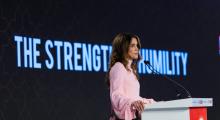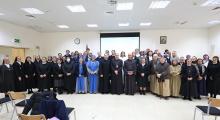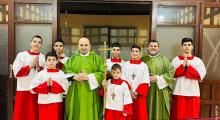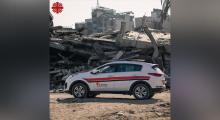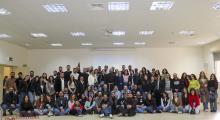Issued by the Catholic Center for Studies and Media - Jordan. Editor-in-chief Fr. Rif'at Bader - موقع أبونا abouna.org
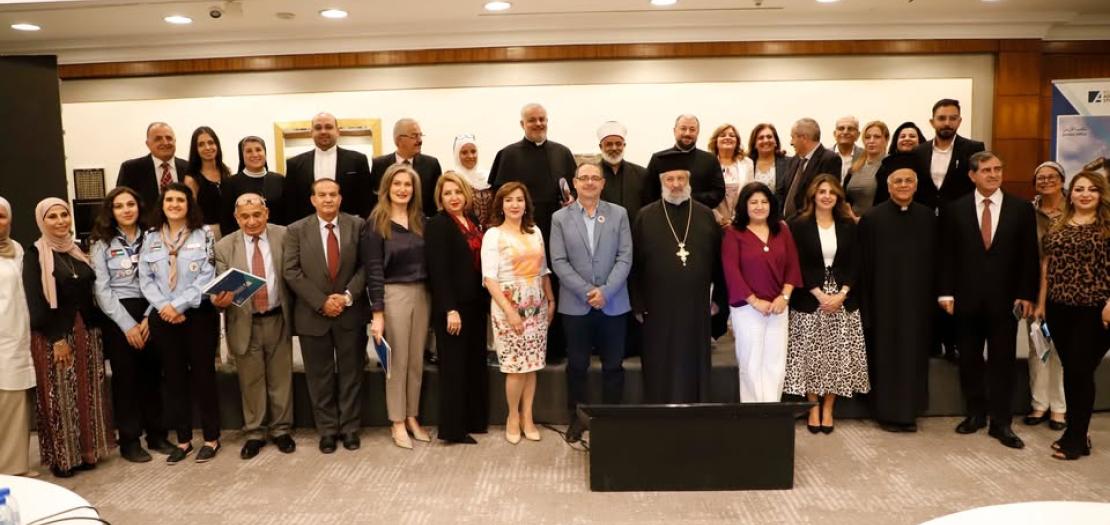
On September 22, 2025, the Catholic Center for Studies and Media (CCSM) in Jordan held a conference on "Civic Education and Religion" titled, " Building a Culture of Citizenship and Social Peace" at the Amman Inter.Continental Hotel", under the patronage of Minister of Education and Higher Education Dr. Azmi Mahafzah. The conference was held in cooperation with the Jordanian Center for Civic Education and Konrad Adenauer Stiftung.
The conference aimed to initiate an engagement among civic education, digital dialogue, and the role of religions in enhancing a culture of societal peace. It also aimed to highlight the importance of civic education in fostering the values of active citizenship and social responsibility, while discussing the challenges and opportunities presented by digital space for cultural and religious dialogue.
At the opening session, moderated by journalist Sara Darawsheh, CCSM Director Fr. Dr. Rif'at Bader welcomed in an opening address the patron of the conference and the attendees, and stressed that there is no contradiction between civic education and religious education, as both complement each other. He said that religious education does not nullify civic education, as civic education supports religious education by constantly directing students towards altruism, a mindset of tolerance, and a culture of encounter.
Fr. Bader pointed out that we live nowadays in a digital age, noting that the use of technology does not mean a retraction in ethics. He said, "This is the balance that we always seek, not only in Jordan but throughout the world, namely that technological progress goes hand-in-hand with moral progress. From this premise, religious education and civic education complement one another when associated with the ethical use of media outlets and artificial intelligence technologies, in a way that preserves human dignity, life, and relationships, in order to build societies and a better world in the future."
Fr. Bader also extended greetings from the attendees to His Majesty King Abdullah II, who is currently in New York to participate in the United Nations General Assembly sessions. He said, "We accompany him with prayers and supplications. May the Lord protect him and bless him, support his daily assiduous and sincere efforts, grant him good health, well-being, as well as impressive and purposeful diplomacy, so that he may remain a voice that calls for justice and peace as well as for the restoration of historical rights to their owners."
Father Bader also quoted the late Pope Francis who said, "We must disarm the media," as well as what Pope Leo XIV said in his opening remarks when he affirmed that our age is one of dialogue, love, and bridge-building. He added, "In this spirit, we gather today, and we pray to God to silence the sound of weapons, destruction, and displacement from the Church of the Holy Family, the Church of Saint Porphyrius, all of Gaza Strip, and in entire Palestine."
For her part, Director of the Jordanian Center for Civic Education Ms. Mona Al-'Alami, stated that building peace is like building a house. It begins with laying strong foundations, which stands for the role of citizenship which asserts our belonging to the land. Then, the walls are built through civic education, which teaches children the values of participation, respect, and responsibility. Lastly, the roof is installed to shelter everyone, which stands for the religious values that instill in the house a spirit and a meaning. She said, "Consequently, the home becomes safe, cohesive, and inclusive."
Ms. Al-Alami added that civic education simply teaches our children to be active citizens who know their rights and duties, as well as to participate in making change, by not remaining spectators. When we integrate civic education with religious values, and the spirit of citizenship we thus create a more just and peaceful society.
She pointed out that the diversity of attendees at the conference sends a clear message that societal peace is a shared responsibility, and that we are jointly capable of enacting a difference. She concluded her address by saying, "Let us be peacemakers, be penchant towards peace, while transforming the ideas reflected on this day into thoughtful initiatives and practical steps that leave a real impact on our communities and provide an inspiration to future generations."
Dr. Edmund Ratka, resident representative of Konrad Adenauer Stiftung (KAS) office in Jordan, noted that the KAS has been operating in Jordan for more than 40 years. He expressed his pride in the personal experience he acquired over the past five years, describing it as "a beautiful and unique experience." He noted that KAS focuses its activities on civic education, political analysis, and international work. He added that all its projects are organized in cooperation with Jordanian partners.
He added that the world is witnessing difficult circumstances, particularly in Palestine. He underlined Jordan's continued effort to convey a message of peace both locally and globally. He stressed that continuing to follow this path necessitates focusing on consolidating the concept of citizenship and promoting education for citizenship. He continued that the conference provides an opportunity to explore how religions can contribute to achieving this goal.
At the conclusion of the opening session, Minister of Education and Higher Education Dr. Azmi Mahafzah delivered an address during which he affirmed the ministry's unwavering commitment to provide conscious individuals, to promote the values of belonging and loyalty, and to elevate the status of education in its capacity as the primary pillar for the advancement of nations and for shaping their future.
He stated that Jordan, under its wise Hashemite leadership, which believes in human dignity, sets a unique model of common living and societal peace as religions and cultures converge on its blessed land, where churches and mosques coexist, and people of all affiliations live in harmony. He emphasized that the unifying national identity has always been the broadest framework for all differences, and the broadest arena where the values of tolerance, justice, and human dignity converge.
He continued that education in Jordan has never been an administrative matter, but rather a comprehensive cultural project which believes that humans are the foundation for building a state and a society. He added, "We view education as the system that shapes the individuals' thoughts and conscience, while imparting the values of belonging, responsibility, and active citizenship."
He pointed out that the role of education has evolved in the modern era, as it is no longer confined to the transfer of knowledge, but rather focused on building an educational system that promotes both mind and conscience. He said that the curricula constitute the cornerstone of this process, as the ministry strives to develop curricula that create a balance between educational knowledge and human values, to promote thinking and excellence faculties, and to instill the principles of tolerance and common living while ensuring that these curricula reflect national identity and open windows to the world for students so as to enable them to become universal citizens who do not abandon their roots.
He added that no matter how good curricula are, they remain deficient unless they have qualified teachers to impart them to students. Consequently, the ministry pays great attention to the rehabilitation and training of teachers, as they are the role models who instill in students a desire to acquire knowledge and practically embody the values of justice, dialogue, and respect.
He pointed out that schools are the primary source of the educational process and the starting point for horizons of development, as they represent a role model of the desired society. He emphasized that the relationship of mutual respect, shared responsibility, and constructive dialogue within schools are not merely an organizational issue, but rather a daily practice that trains our children to accept the values of active citizenship and societal peace.
The minister concluded his address by emphasizing that what we aspire to is to have a generation who believes that citizenship is not a slogan but rather a practice; that religion is not merely rites but a system of moral values reflected in behavior; and that diversity is not a threat but rather a source of strength. He said, "We aspire to have a generation that will continue to consolidate Jordan's civilizational message when we make education a path for peace, unity, and construction",
The conference included three sessions. The first session touched on "building a culture of dialogue and societal peace in an age of polarization and radicalization". The session was moderated by Dr. Edmund Ratka, resident representativeof Konrad Adenauer Stiftung, Jordan Office.The panelists were Dr. Wajih Kanso, professor of philosophy at the Lebanese University; Member of the Upper House of Parliament Dr.Haifa Najjar; former minister Dr. Sabri Irbeihat; and lectures and researcher at the Center for Islamic -Christian Studies in Huston Dr. Mu'taz Al-Taher.
The second session discussed, "The hazards and capabilities of the digital age with reference to civic and religious education". The session was moderated by Mr.Omar Abawi. The panelists were Engineer Majdi Qabalin, an expert in Cyber security and digital crimes; Ms. Chahrazad Ben Hamida, legal researcher and expert in conflict management from Tunisia; CCSM Director Fr. Dr.Rif'at Bader; and Educational Adviser Ms.Rania Dahabreh.
The third session answered the question, "How can schools contribute to introducing a culture of citizenship and common living?" The moderator was Mr.Khalil Radwan, trainer and expert in civic education and human rights. The panelists were Dr. Asma Al Sharrab, coordinator of social studies curricula at the Ministry of Education;Dr. Aseel Shawareb, head, of humanities department at Petra University; and Fr. Firas Nasrawin, director general of the Latin Patriarchate Schools in Jordan.


